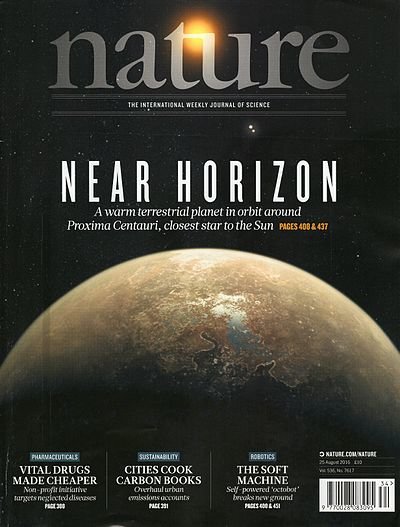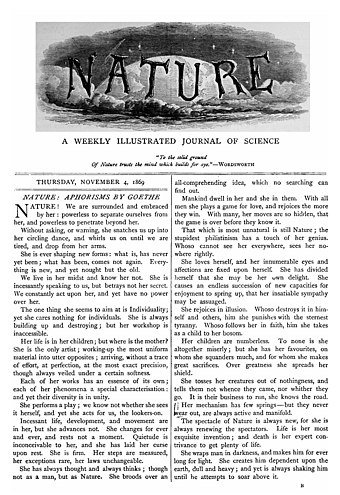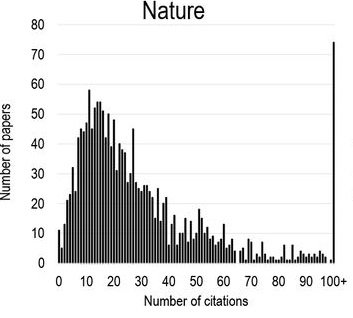British Heritage
Remember, Cherish, Learn.
beta
Nature - Respected Scientific Journal
Contribution of Nature Journal to British Heritage.
Nature, one of the world's most-read, most-cited, and most prestigious academic journals, holds a significant place in British heritage due to its pioneering role in scientific publishing and its immense contributions to the advancement of science and technology. Since its establishment in 1869 in London, England, Nature has served as a forum for scientific innovations, research breakthroughs, and the dissemination of knowledge to both the scientific community and the general public.
Nature's enduring legacy lies in its reputation as a leading scientific publication that features peer-reviewed research from various academic disciplines. Its status as one of the most cited scientific journals underscores its influence and impact on the scientific community. Over the years, Nature has published landmark papers and breakthrough discoveries, making it a hub for cutting-edge research.
Founded by Norman Lockyer and Alexander Macmillan, Nature aimed to connect the general public to scientific advancements and educate readers on scientific knowledge. Throughout its history, the journal underwent editorial expansions, and by the mid-20th century, it emphasized explanatory and scientific journalism. Nature's influence expanded globally with the establishment of editorial offices in different countries.
Nature serves as a multidisciplinary publication, covering a wide range of scientific fields, including biology, physics, chemistry, astronomy, and more. Its content comprises papers, articles, and letters that are highly technical and dense, reflecting the depth and breadth of scientific research.
Many significant scientific breakthroughs have been first published in Nature, cementing its reputation as a premier scientific journal. The discovery of the structure of DNA by Watson and Crick in 1953, for instance, was first unveiled in Nature. Other groundbreaking research on various topics has also found its way into the journal's pages.
Nature's rigorous peer review process ensures that published papers maintain high research standards. Articles undergo initial screening by the editor and subsequent review by independent experts in the field before publication. The journal's commitment to maintaining the quality and accuracy of scientific content has contributed to its credibility and standing in the scientific community.
Despite its esteemed reputation, Nature has faced controversies and challenges, including the publication of fraudulent papers, the rejection of seminal works, and debates on the handling of certain scientific issues. However, these incidents have also demonstrated the journal's commitment to transparency and accountability in scientific publishing.
Being published in Nature holds significant prestige in academia, leading to increased citations, recognition, grant funding, and media attention for scientists. Its positive feedback effects make it a highly sought-after venue for researchers seeking to disseminate their groundbreaking work.
Nature's international offices and collaborations have allowed it to reach a global audience of millions, providing valuable scientific knowledge to researchers, educators, and the general public worldwide.
In conclusion, Nature's long-standing history, its role in publishing seminal scientific discoveries, and its commitment to disseminating cutting-edge research have made it an integral part of British heritage and a cornerstone of the scientific community. Its legacy as a prominent scientific journal continues to shape the advancement of knowledge and inspire new generations of scientists to push the boundaries of human understanding.
Legacy and Success
Nature's enduring legacy lies in its reputation as a leading scientific publication that features peer-reviewed research from various academic disciplines. Its status as one of the most cited scientific journals underscores its influence and impact on the scientific community. Over the years, Nature has published landmark papers and breakthrough discoveries, making it a hub for cutting-edge research.
History and Evolution
Founded by Norman Lockyer and Alexander Macmillan, Nature aimed to connect the general public to scientific advancements and educate readers on scientific knowledge. Throughout its history, the journal underwent editorial expansions, and by the mid-20th century, it emphasized explanatory and scientific journalism. Nature's influence expanded globally with the establishment of editorial offices in different countries.
Range of Coverage
Nature serves as a multidisciplinary publication, covering a wide range of scientific fields, including biology, physics, chemistry, astronomy, and more. Its content comprises papers, articles, and letters that are highly technical and dense, reflecting the depth and breadth of scientific research.
Scientific Discoveries
Many significant scientific breakthroughs have been first published in Nature, cementing its reputation as a premier scientific journal. The discovery of the structure of DNA by Watson and Crick in 1953, for instance, was first unveiled in Nature. Other groundbreaking research on various topics has also found its way into the journal's pages.
Peer Review Process
Nature's rigorous peer review process ensures that published papers maintain high research standards. Articles undergo initial screening by the editor and subsequent review by independent experts in the field before publication. The journal's commitment to maintaining the quality and accuracy of scientific content has contributed to its credibility and standing in the scientific community.
Controversies and Challenges
Despite its esteemed reputation, Nature has faced controversies and challenges, including the publication of fraudulent papers, the rejection of seminal works, and debates on the handling of certain scientific issues. However, these incidents have also demonstrated the journal's commitment to transparency and accountability in scientific publishing.
Impact on Academia
Being published in Nature holds significant prestige in academia, leading to increased citations, recognition, grant funding, and media attention for scientists. Its positive feedback effects make it a highly sought-after venue for researchers seeking to disseminate their groundbreaking work.
Global Reach and Influence
Nature's international offices and collaborations have allowed it to reach a global audience of millions, providing valuable scientific knowledge to researchers, educators, and the general public worldwide.
In conclusion, Nature's long-standing history, its role in publishing seminal scientific discoveries, and its commitment to disseminating cutting-edge research have made it an integral part of British heritage and a cornerstone of the scientific community. Its legacy as a prominent scientific journal continues to shape the advancement of knowledge and inspire new generations of scientists to push the boundaries of human understanding.
- Nature (journal)en.wikipedia.org








